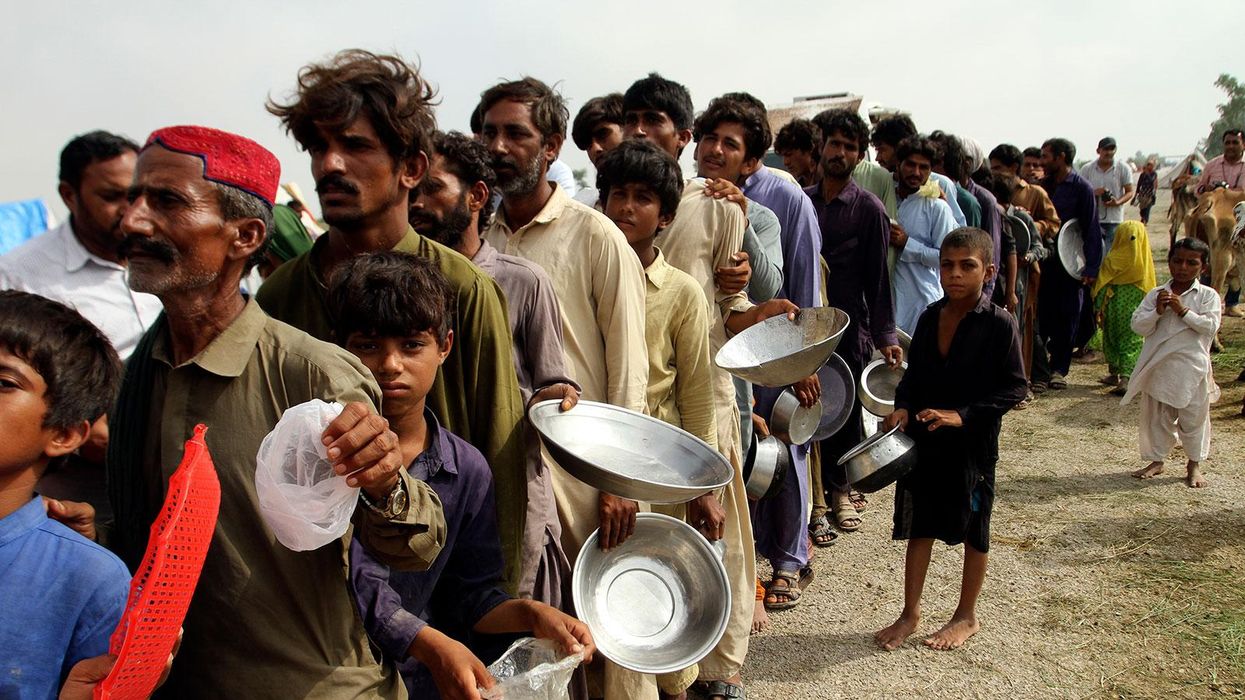(CNN) -- Pakistan was already struggling when the devastating monsoon rains hit.
This year, economic and political crises have converged in the South Asian nation of more than 230 million, as food and fuel prices soared and former leader Imran Khan was forced from office.
Now it's reeling with the worst floods in living memory.
Swaths of Pakistan are now underwater after experiencing the heaviest rains on record with little reprieve since mid-June. Some areas have seen five times their normal levels of monsoonal rain.
More than 1,100 people have died and 33 million people are impacted -- that's more than the population of Texas.
Torrents of water have smashed through entire villages and farmland, razing buildings and wiping out crops. Satellite images from Maxar Technologies shared with CNN show how communities have been wiped out, leaving behind little more than bare Earth and dust.
Pakistan is responsible for less than 1% of the world's planet-warming gases, European Union data shows, yet it is the eighth most vulnerable nation to the climate crisis, according to the Global Climate Risk Index. It's paying a hefty price, not only with lives but destroyed schools, homes and bridges.
Officials estimate the total bill will be $10 billion. The recovery could take years, the International Federation of Red Cross and Red Crescent Societies in Pakistan has said. And chances are any recovery will be interrupted by yet another disaster.
"We consistently see climate devastation in the forms of floods, monsoons, extensive droughts, extreme heat waves," Pakistan's Foreign Minister Bilawal Bhutto Zardari said in an interview with CNN's Eleni Giokos on Tuesday.
"And frankly, the people of Pakistan, the citizens of Pakistan, are paying the price in their lives, their livelihoods for the industrialization of rich countries that has resulted in this climate change."
The stark inequity of the climate crisis, which is bearing down hardest on nations that have historically had the least to do with causing it, is raising questions over who should pay for it, particularly for the damage that countries like Pakistan are coming to terms with.
The United Nations issued an appeal for $160 million in emergency funds on Tuesday, barely enough to scratch the surface of the $10 billion needed. Countries from the United States to Turkey are pitching in with aid, rescue helicopters, food and medical supplies. Yet the need is greater than what the world is giving.
These devastating scenes and eye-watering recovery costs are what the climate crisis looks like at 1.2 degrees Celsius of global warming since industrialization.
But the world is on track for warming of more than 2 degrees Celsius, analyses show, and scientists warn every fraction of a degree of warming will worsen the impacts of the crisis.
Fahad Saeed, a climate scientist with the group Climate Analytics, who is based in Islamabad, told CNN that Pakistan was in a Catch-22 situation. The country needs money to adapt to the crisis, yet because it has to pay for the damage that extreme weather is already causing it will struggle to find the funds it needs to adjust.
"What is happening right now at 1.2 degrees centigrade of warming is not because of the poor people in Pakistan," he said. "They are not responsible for it, and this brings out the issue of climate justice in a very clear form."
He added that Pakistan, like so many developing nations, needed to bring more people out of poverty, a difficult thing to do in the midst of back-to-back extreme weather events with such little financial support from abroad.
Saeed said Pakistan was in "a position to present a strong case" at the COP27 international climate talks in Egypt this November that other nations should help it pay to pick up the pieces. Developed and developing nations have remained generally divided over the issue for years.
The developed world agreed more than a decade ago to transfer at least $100 billion a year by 2020 to developing nations to help their transitions away from fossil fuels, but also to help them adapt to climate change. That amount has never been delivered in full.
More controversial is the issue of who should pay for the destruction. At the COP26 climate talks in Glasgow, the US was one of several advanced nations that showed opposition to obligatory payments for "loss and damages" -- essentially climate compensation -- particularly for schemes based on historic responsibility.
Historically, the US accounts for the most greenhouse gas emissions in the world.
The-CNN-Wire
™ & © 2022 Cable News Network, Inc., a Warner Bros. Discovery Company. All rights reserved.


















































